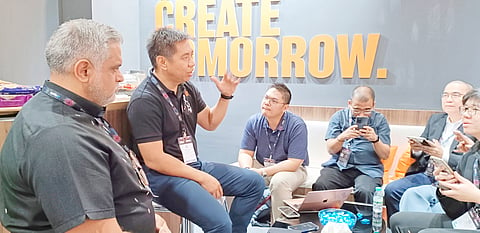
- HEADLINES
- NEWS
- PAGE THREE
- COMMENTARY
- BUSINESS
- LIFE
- ACTION
- GLOBAL GOALS
- SNAPS
- DYARYO TIRADA
- MORE

SINGAPORE — Overseas Filipino workers and ordinary people with little or no access to banking have a lot to look forward to with artificial intelligence, or AI, driving financial technical innovations in the months to come.
UnionDigital Bank executives Henry Aguda and Mike Singh on Thursday announced to journalists attending the Singapore Fintech Festival 2023 that 2024 will be a game-changer year for the banking behemoth and its allied companies like UnionDigital Bank and UBX.
SFF 2023 drew to a close on Friday with hundreds of exhibitors and thousands of attendees, many of them young people hoping to become the next Bill Gates, Elon Musk or Mark Zuckerberg, as they looked for ideas and financing for startup companies they want to put up.
Amid the din of the veritable agora of tech germination in what may emerge as the biggest "revenge" staging of SFF, Aguda noted that "blockchain" was the buzzword for the 2022 holding of the festival. For this year, it's undoubtedly AI, he said.
Looking at his crystal ball, Aguda, president and chief executive of Ubeh and chairman of UBX Philippines, as well as vice chair of Union Bank City Savings, predicted that "purpose-bound" financial transactions will take the world by storm next year.
For OFWs, according to Aguda, this would mean purpose-bound remittances from wherever they are in the world to their families in the Philippines or their basket of diversified investments.
Seventh appearance
"This has become a tradition for Union Bank. So we've been coming here for six years, and this is our seventh," Aguda said in a roundtable discussion with Singh, a standout UAAP player for Ateneo in the 1990s, and journalists at the second floor of UB's tech-heavy exhibit at SFF 2023.
"The only time that we didn't come here was one year during the pandemic, but it's always nice to showcase what the Philippines has to offer in terms of our financial innovations. Everybody comes here," added the CEO of the digital banking subsidiary of Union Bank of the Philippines.
In the middle of the year, UD, subject to Bangko Sentral ng Pilipinas approval, secured P900 million in capitalization from Union Bank of the Philippines as the latter's digital banking subsidiary.
Aguda pointed out that while the pandemic somehow put a damper on fintech initially, it also proved to be its boon as it fast-tracked people's acceptance of online and digital financial transactions as they were forced to buy food and everything else while at home.
Presently, he said UB is "working as fast as if the pandemic did not happen," adding: "We're pickling up from where we left off. So we want to scale everything up. Additional concepts that you might be hearing in the future would be purpose-bound remittance."
Aside from lowering the cost of remittances further, Aguda said that with blockchain, not only would OFWs be able to track where their money goes, but it would also help digital banks serve them better. "If we know where the mind is heading, we'd be able to lend them more," he explained.
Singh, chief commercial and revenue officer of UnionDigital Bank, explained that nearly half of the Philippines' population is unbanked, especially middle and low income groups that Union Bank wants to have access to financing for their livelihoods and small enterprises.
Risk-averse
Singh said seven out of 10 Filipinos borrow money, but of the number, only one goes to institutional lenders like banks, with the rest borrowing from relatives, friends and, at times, from neighborhood loan sharks known for their usurious 5-6 schemes.
"I think the problem in emerging markets like the Philippines, where you have 50 million unbanked (people), is that banks are risk-verse, right? If they don't know who you are, you're not in the bureau," Singh said.
"You don't have a credit card. You don't have a Meralco bill. You don't have a Globe postpaid bill, how are they going to trust you with money? That's why, in the Philippines, we have a very large unbanked population."
In unbanked, Singh clarified that he was talking about not having access to credit and not just have a deposit in a bank. He said the innovation they are doing through AI is that as Filipinos are digitally savvy, they could offer to lend money to those who have smartphones and have social media accounts.
In place of the typical credit scores of people with access to credit, Singh said UD would leverage its being a leader in crypto adoption in looking at digital data as basis to lend money.
While traditional banks use traditional demographics like income, age and dependence to score a digital footprint, there are 1,000 pieces of data points that digital banks can use to predict loan repayment behavior.
This, according to Singh, would allow the unbanked to suddenly have access to flexible financing whose terms could be as short as two weeks or one week.
"So this is the innovation we're using as the whole theme of the conference in our booth is AI. So you feed that data into a machine, and AI will start to profile," Singh explained.
"That's how you use AI and be innovative about driving inclusion to the unbanked, where you have many of the adult population what we call off grid in the bureau, no tax return, but they're digitally savvy."
He added that with AI, they'll be able to drive financial inclusion to the lower half of the income pyramid, explaining that "over 60 percent of our borrowers are earning less than P20,000 a month."
"So if that's not inclusion, I don't know what is," Singh said.
